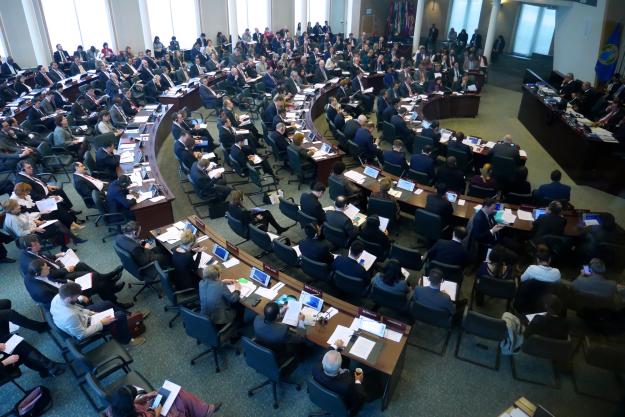
Delegates at the 84th Executive Council Session of the Organisation for the Prohibition of Chemical Weapons
THE HAGUE, Netherlands — 10 March 2017 — The Organisation for the Prohibition of Chemical Weapons’ (OPCW) Executive Council (EC) adopted a decision yesterday expressing grave concern that, according to statements by the Government of Malaysia, a chemical weapon – the Schedule 1 nerve agent VX – was used in a fatal incident on 13 February 2017 at Kuala Lumpur International Airport 2.
The Council unequivocally condemned the use of any chemical weapon by anyone under any circumstances as reprehensible and completely contrary to the legal norms and standards of the international community. It called for those responsible for the use of chemical weapons to be held accountable.
Furthermore, the Council asked the OPCW’s Director-General to provide technical assistance upon request from Malaysian authorities for its national investigation. The Council underscored its deep interest in receiving and considering the official results of the investigation, once the Government of Malaysia has completed it.
Background
On 13 February a fatal incident allegedly involving the use of VX nerve agent at the Kuala Lumpur International Airport 2 in Malaysia was reported. In his letter of 24 February 2017, the OPCW Director-General offered technical assistance to the Government of Malaysia in support of its investigation.
On 3 March 2017, the Ministry of Foreign Affairs of Malaysia issued a statement that a toxic chemical – the Schedule 1 nerve agent VX – was used in a fatal incident on 13 February 2017 at Kuala Lumpur International Airport 2. On 7 March 2017, the Permanent Representative of Malaysia to the OPCW made a statement to the OPCW Executive Council during its 84th session, providing further details about the Government of Malaysia’s response to the incident.
The Executive Council is the executive organ of the OPCW and consists of 41 members from the five regional groups. The EC is responsible to the 192 members of the Conference of the States Parties. The EC promotes the effective implementation of the Chemical Weapons Convention (CWC), and compliance with it. The EC also supervises the activities of the Technical Secretariat. The Council cooperates with the National Authorities of Member States and facilitates consultations and cooperation among them at their request.
As the implementing body for the Chemical Weapons Convention, the OPCW oversees the global endeavour to permanently and verifiably eliminate chemical weapons. Since the Convention’s entry into force in 1997 – and with its 192 States Parties – it is the most successful disarmament treaty eliminating an entire class of weapons of mass destruction.
To date, approximately 95 per cent of all chemical weapon stockpiles declared by possessor States have been destroyed under OPCW verification. For its extensive efforts in eliminating chemical weapons, the OPCW received the 2013 Nobel Prize for Peace.
More Information
- Chemical Weapons Incident in Kuala Lumpur, Malaysia (9 March 2017)
- Statement from the Permanent Representative of Malaysia to the 84th Session of Executive Council (7 March 2017)
- Statement from OPCW Spokesperson in response to media queries regarding alleged use of nerve agent VX in Malaysia (24 February 2017)
- OPCW Fact Sheets
